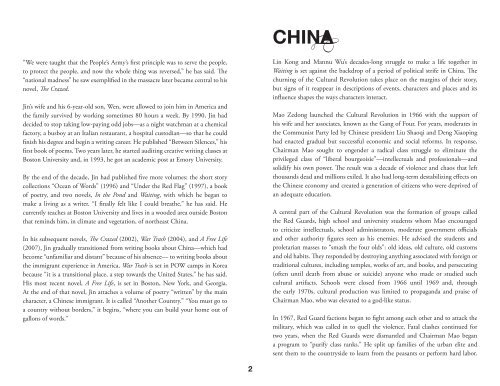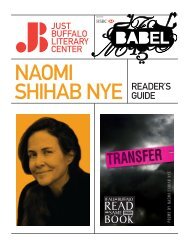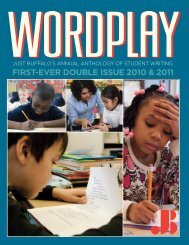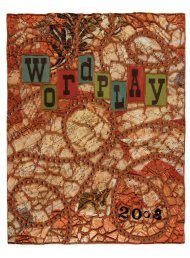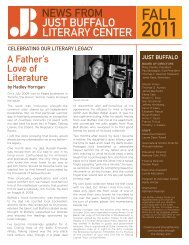Ha Jin - Just Buffalo Literary Center
Ha Jin - Just Buffalo Literary Center
Ha Jin - Just Buffalo Literary Center
Create successful ePaper yourself
Turn your PDF publications into a flip-book with our unique Google optimized e-Paper software.
CHINA“We were taught that the People’s Army’s first principle was to serve the people,to protect the people, and now the whole thing was reversed,” he has said. The“national madness” he saw exemplified in the massacre later became central to hisnovel, The Crazed.<strong>Jin</strong>’s wife and his 6-year-old son, Wen, were allowed to join him in America andthe family survived by working sometimes 80 hours a week. By 1990, <strong>Jin</strong> haddecided to stop taking low-paying odd jobs—as a night watchman at a chemicalfactory, a busboy at an Italian restaurant, a hospital custodian—so that he couldfinish his degree and begin a writing career. He published “Between Silences,” hisfirst book of poems. Two years later, he started auditing creative writing classes atBoston University and, in 1993, he got an academic post at Emory University.By the end of the decade, <strong>Jin</strong> had published five more volumes: the short storycollections “Ocean of Words” (1996) and “Under the Red Flag” (1997), a bookof poetry, and two novels, In the Pond and Waiting, with which he began tomake a living as a writer. “I finally felt like I could breathe,” he has said. Hecurrently teaches at Boston University and lives in a wooded area outside Bostonthat reminds him, in climate and vegetation, of northeast China.In his subsequent novels, The Crazed (2002), War Trash (2004), and A Free Life(2007), <strong>Jin</strong> gradually transitioned from writing books about China—which hadbecome “unfamiliar and distant” because of his absence— to writing books aboutthe immigrant experience in America. War Trash is set in POW camps in Koreabecause “it is a transitional place, a step towards the United States,” he has said.His most recent novel, A Free Life, is set in Boston, New York, and Georgia.At the end of that novel, <strong>Jin</strong> attaches a volume of poetry “written” by the maincharacter, a Chinese immigrant. It is called “Another Country.” “You must go toa country without borders,” it begins, “where you can build your home out ofgallons of words.”Lin Kong and Mannu Wu’s decades-long struggle to make a life together inWaiting is set against the backdrop of a period of political strife in China. Thechurning of the Cultural Revolution takes place on the margins of their story,but signs of it reappear in descriptions of events, characters and places and itsinfluence shapes the ways characters interact.Mao Zedong launched the Cultural Revolution in 1966 with the support ofhis wife and her associates, known as the Gang of Four. For years, moderates inthe Communist Party led by Chinese president Liu Shaoqi and Deng Xiaopinghad enacted gradual but successful economic and social reforms. In response,Chairman Mao sought to engender a radical class struggle to eliminate theprivileged class of “liberal bourgeoisie”—intellectuals and professionals—andsolidify his own power. The result was a decade of violence and chaos that leftthousands dead and millions exiled. It also had long-term destabilizing effects onthe Chinese economy and created a generation of citizens who were deprived ofan adequate education.A central part of the Cultural Revolution was the formation of groups calledthe Red Guards, high school and university students whom Mao encouragedto criticize intellectuals, school administrators, moderate government officialsand other authority figures seen as his enemies. He advised the students andproletarian masses to “smash the four olds”: old ideas, old culture, old customsand old habits. They responded by destroying anything associated with foreign ortraditional cultures, including temples, works of art, and books, and persecuting(often until death from abuse or suicide) anyone who made or studied suchcultural artifacts. Schools were closed from 1966 until 1969 and, throughthe early 1970s, cultural production was limited to propaganda and praise ofChairman Mao, who was elevated to a god-like status.In 1967, Red Guard factions began to fight among each other and to attack themilitary, which was called in to quell the violence. Fatal clashes continued fortwo years, when the Red Guards were dismantled and Chairman Mao begana program to “purify class ranks.” He split up families of the urban elite andsent them to the countryside to learn from the peasants or perform hard labor.2


